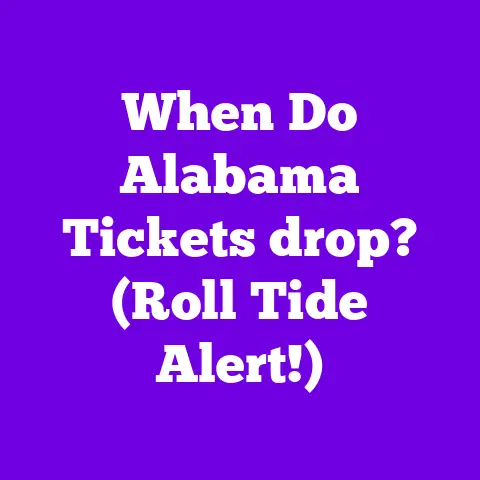When Will Black Friday sales Start? (Don’t Miss Pre-Deals!)
The retail landscape is in constant flux.
Innovation, fueled by rapid technological advancements and evolving consumer behavior, has reshaped how we shop, discover products, and interact with brands.
Gone are the days of static catalogs and predictable shopping patterns.
Today, personalized recommendations, seamless mobile experiences, and instant social media engagement dominate the retail scene.
Black Friday, once a single-day stampede in physical stores, has undergone a dramatic transformation, becoming a sprawling event that now stretches for weeks, even months, thanks to the rise of “pre-deals.”
Black Friday remains a pivotal moment in the retail calendar, a barometer of consumer confidence and a crucial opportunity for businesses to boost their bottom line.
Understanding the timeline of these sales, especially in the context of 2025, and the increasing importance of pre-deals is essential for both savvy shoppers and strategic retailers.
In this article, I will explore the evolution of Black Friday, analyze the trends shaping the 2025 shopping season, and delve into the world of pre-deals, uncovering the strategies and innovations that are driving this exciting new phase of retail.
The Evolution of Black Friday
Black Friday’s origins can be traced back to the 1950s in Philadelphia, where police used the term to describe the chaos caused by hordes of suburban shoppers flooding into the city the day after Thanksgiving.
Source: History.com.
It wasn’t until the 1980s that the term gained widespread use, with retailers rebranding it as a positive, signifying the day their businesses “went into the black” (became profitable) for the year.
The rise of e-commerce in the late 1990s and early 2000s marked a turning point.
Online retailers began offering Black Friday deals, extending the shopping frenzy beyond physical stores.
Amazon, for instance, played a significant role in popularizing online Black Friday sales, offering a vast selection of products and convenient shopping experiences.
As mobile technology advanced, mobile shopping became increasingly prevalent.
According to Statista, mobile commerce accounted for 43.1% of all e-commerce sales in 2023, and this number is projected to continue growing Source: Statista.
Social media has further revolutionized Black Friday.
Retailers now leverage platforms like Instagram, Facebook, and TikTok to promote deals, engage with customers, and create a sense of urgency.
Influencer marketing has also become a powerful tool, with brands partnering with social media personalities to reach a wider audience.
Key milestones in the evolution of Black Friday sales include:
- The Rise of Cyber Monday: Introduced in 2005, Cyber Monday provided an online alternative for those who preferred to shop from the comfort of their homes.
Source: National Retail Federation - The Expansion of Black Friday Week: Retailers began extending Black Friday sales to encompass the entire week leading up to the event.
- The Emergence of Pre-Deals: Recognizing the potential for early sales, retailers started offering pre-deals weeks, and sometimes even months, before Black Friday.
Understanding Black Friday in 2025
Predicting the exact landscape of Black Friday in 2025 requires analyzing current market trends and anticipating future shifts in consumer behavior.
The traditional date for Black Friday falls on the Friday after Thanksgiving, which means Black Friday 2025 will be on November 28th.
However, the actual shopping season will likely begin much earlier.
In recent years, retailers have started offering Black Friday-level deals as early as October, blurring the lines between regular sales and the official Black Friday event.
I anticipate this trend to continue in 2025, with pre-deals starting even earlier than in previous years.
Economic factors will also play a significant role.
Inflation, supply chain disruptions, and fluctuating consumer confidence can all impact sales patterns.
If inflation remains high, consumers may be more price-sensitive and selective in their purchases.
Supply chain issues could lead to inventory shortages, potentially driving up prices and limiting the availability of certain products.
A recent report by Deloitte indicates that consumers are increasingly prioritizing value and convenience when making purchasing decisions.
Source: Deloitte 2023 Holiday Retail Survey This suggests that retailers who offer competitive prices, seamless shopping experiences, and flexible return policies will be best positioned to succeed in 2025.
The Rise of Pre-Deals
Pre-deals are promotional offers that retailers launch in the weeks or months leading up to Black Friday.
They differ from traditional Black Friday sales in several ways:
- Timing: Pre-deals start earlier, often in October or even September.
- Exclusivity: Some pre-deals are exclusive to online shoppers or members of loyalty programs.
- Variety: Pre-deals may include a wider range of products than traditional Black Friday sales.
- Stock: Limited stock for some items
Pre-deals are important for both consumers and retailers.
For consumers, they offer the opportunity to snag deals early, avoid the Black Friday crowds, and spread out their holiday spending.
For retailers, pre-deals provide several advantages:
- Early Revenue: Pre-deals generate revenue before Black Friday, helping retailers meet their sales targets.
- Inventory Management: Pre-deals allow retailers to clear out excess inventory and make room for new products.
- Customer Engagement: Pre-deals create buzz and excitement around Black Friday, driving customer engagement.
- Data Collection: Pre-deals provide retailers with valuable data on consumer preferences and buying habits.
Retailers employ a variety of strategies to promote pre-deals, including:
- Targeted Advertising: Using data analytics to identify potential customers and deliver personalized ads.
- Exclusive Online Events: Hosting online sales events with limited-time offers and exclusive products.
- Social Media Campaigns: Creating engaging content on social media to promote pre-deals and drive traffic to their websites.
- Email Marketing: Sending targeted emails to subscribers with exclusive pre-deal offers.
Major Retailers and Their Strategies for 2025
Major retailers like Amazon, Walmart, Target, and Best Buy are all expected to participate in Black Friday 2025, with each employing unique strategies to attract customers and maximize sales.
- Amazon: Amazon is likely to continue its tradition of offering a wide range of pre-deals across various product categories.
I expect Amazon to leverage its Prime membership program to offer exclusive deals and benefits to subscribers. - Walmart: Walmart will focus on offering competitive prices on popular products, particularly in the electronics and home goods categories.
I anticipate Walmart to continue investing in its online platform and offering convenient pickup and delivery options. - Target: Target will emphasize its exclusive brands and partnerships, offering unique products that cannot be found elsewhere.
I expect Target to leverage its loyalty program, Target Circle, to offer personalized deals and rewards to members. - Best Buy: Best Buy will focus on offering deals on electronics and appliances, particularly on popular brands like Samsung, Apple, and LG.
I anticipate Best Buy to continue investing in its Geek Squad services and offering expert advice to customers.
In previous years, successful pre-deal campaigns have included:
- Amazon’s Prime Early Access Sale: An exclusive event for Prime members offering early access to Black Friday deals.
- Walmart’s Deals for Days: A series of online and in-store events offering deals on a variety of products.
- Target’s Deal Days: A multi-day event offering deals on exclusive brands and partnerships.
- Best Buy’s Black Friday in July: A summer sale offering Black Friday-level deals on electronics and appliances.
I predict that these retailers will continue to refine their pre-deal strategies in 2025, leveraging technology, data analytics, and consumer insights to optimize their sales efforts.
We will see a greater emphasis on personalization, with retailers using data to tailor deals and recommendations to individual customers.
We will also see a greater focus on mobile shopping, with retailers optimizing their mobile apps and websites for a seamless shopping experience.
Consumer Behavior and Expectations for Black Friday 2025
Consumer expectations for Black Friday have shifted dramatically in recent years.
The rise of e-commerce and mobile shopping has made shopping more convenient and accessible than ever before.
Consumers now expect to be able to shop from anywhere, at any time, using any device.
Social media and influencer marketing play a significant role in shaping consumer perceptions and driving pre-deal interest.
Consumers are increasingly turning to social media for product recommendations, reviews, and deals.
Influencers can sway consumer opinions and drive sales by promoting products and brands to their followers.
A study by Klear found that influencer marketing spend increased by 42% in 2023, indicating its growing importance in the retail landscape Source: Klear State of Influencer Marketing 2023.
In 2025, consumers are likely to be looking for the following:
- Competitive Prices: Price will remain a major factor in consumer purchasing decisions.
- Convenient Shopping Experiences: Consumers will expect seamless online and mobile shopping experiences.
- Personalized Deals and Recommendations: Consumers will appreciate personalized deals and recommendations based on their individual preferences.
- Flexible Return Policies: Consumers will want to be able to return products easily if they are not satisfied.
- Reliable Shipping and Delivery: Consumers will expect reliable shipping and delivery, with timely updates on the status of their orders.
Product categories that are likely to be popular in 2025 include electronics, apparel, home goods, and toys.
However, the specific products that are in demand will vary depending on the latest trends and innovations.
The Role of Technology in Shaping Black Friday Sales
Technological innovations are poised to further transform the Black Friday shopping experience.
Artificial intelligence (AI) is already being used to personalize recommendations, optimize pricing, and improve customer service.
Virtual reality (VR) and augmented reality (AR) could potentially offer immersive shopping experiences, allowing consumers to try on clothes or visualize furniture in their homes before making a purchase.
Mobile apps are becoming increasingly important for Black Friday shopping.
Retailers are investing in their mobile apps to offer exclusive deals, personalized recommendations, and convenient checkout options.
Mobile payment options like Apple Pay and Google Pay are also becoming more popular, making it easier for consumers to make purchases on the go.
The growing importance of personalized shopping experiences is driving retailers to invest in data analytics and customer relationship management (CRM) systems.
By collecting and analyzing data on consumer behavior, retailers can create more targeted marketing campaigns and offer more personalized deals.
Future trends in technology that could further disrupt traditional Black Friday sales include:
- The Metaverse: Virtual worlds could offer new opportunities for retailers to engage with customers and sell products.
- Blockchain Technology: Blockchain could be used to improve supply chain transparency and prevent fraud.
- Drones: Drones could be used to deliver products to customers more quickly and efficiently.
Conclusion
As I’ve discussed, the start of Black Friday sales is no longer confined to a single day.
The rise of pre-deals has transformed Black Friday into a sprawling event that begins weeks, and sometimes months, in advance.
In 2025, I expect this trend to continue, with retailers launching pre-deals even earlier than in previous years.
Innovation will continue to play a crucial role in shaping retail experiences and consumer engagement.
Retailers who embrace technology, leverage data analytics, and prioritize customer satisfaction will be best positioned to succeed in the ever-evolving Black Friday landscape.
As we approach Black Friday 2025, I encourage you to stay informed, do your research, and take advantage of the innovative strategies that retailers are employing to attract your attention and earn your business.
The shopping landscape is constantly evolving, and the savvy consumer who understands these trends will be best equipped to navigate the exciting world of Black Friday deals.






